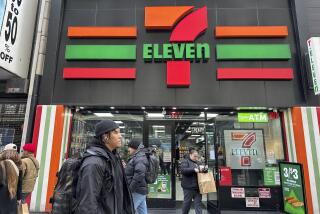New Investors to Own 49% of 7-Up Merger
DALLAS — A group led by Prudential-Bache Interfunding Inc. will become a major stockholder in the new firm merging the Seven-Up and Dr Pepper holding companies, officials said Wednesday as they announced terms of the $1.3-billion transaction.
Prudential-Bache Interfunding--the merchant banking arm of Prudential-Bache Securities Inc.--and other investors will own 49% of Dr Pepper-Seven-Up Cos., which will be the third-largest soft-drink company in the nation behind Coca-Cola Co. and PepsiCo.
After the deal is completed, existing shareholders and senior management will own 51% of the merged operation, the companies said in a statement. Dr Pepper Holding Co. and Seven-Up Holding Co. announced last month that they had agreed to merge.
The companies’ current stockholders will be paid a total of $500 million in cash and $100 million in debt and preferred stock, the statement said.
Exactly how much will go to each company’s stockholders has not been determined, spokesman Tom Bayer said.
Proposed Plan in March
Prudential-Bache’s role in the new company was not foreseen by management of Seven-Up and Dr Pepper when the pair announced their initial merger agreement, Bayer said.
Prudential-Bache approached the companies in March and proposed to buy into the merged operation, he said.
Financing for the transaction incudes about $75 million of additional bank borrowings by Dr Pepper and about $125 million by Seven-Up, arranged with Bankers Trust Co.
The transaction is expected to be consummated within 60 days, company officials said. No new management changes are expected, said John R. Albers, chief executive officer of both Dr Pepper and Seven-Up.
Thomas O. Hicks and Robert B. Haas, who will be co-chairmen of Dr Pepper-Seven-Up Cos., led separate investment groups in the purchase of Dr Pepper Co. and the Seven-Up Co. in 1986.
The companies together have more than 800 employees.
More to Read
Inside the business of entertainment
The Wide Shot brings you news, analysis and insights on everything from streaming wars to production — and what it all means for the future.
You may occasionally receive promotional content from the Los Angeles Times.










